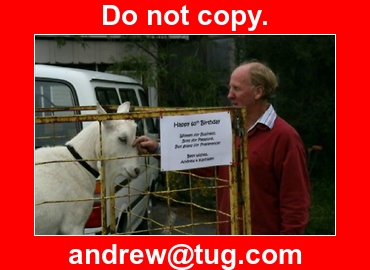The Monty Hall Problem
Peter Lynn was born 60 years ago on the 23rd December. We were invited to his birthday party but we had previously arranged to take Andrew's mother on a tour of Scotland, so we couldn't even consider the trip but we thought that it would be nice to get him a present.
Choosing presents for folk is an art form. It requires inspiration. We don't like the idea that is it a requirement to find some trinket or gift to get someone in order to mark the passing of another year but occasionally, we are inspired with an original and entertaining idea.
The first such present was for our friend Andy Riley. Andy is a true geek, with a house full of computers, tools and technical toys. Several years ago, Andrew took a box that had previously contained some Netgear networking equipment and re-labled it to say "2-port Gigabit Switch". Inside, the box contained a crossover cable. (If you don't get it, never mind - it's a technical joke).
Andy is an exceptionally bright lad, and holds a very respected position in his chosen industry and has got there at a younger age than his peers, thus we sometimes rib him about his tender years. When he held a party for his 30th birthday, we felt that we should mark this with a gift that symbolised his true, unequivocal arrival in adulthood so we decided to present him with a set of tools that reflected his new-found manly status: A 10lb sledgehammer and a two handed felling axe.
About a year ago, Peter Lynn asked me the "Three door question". It goes something like this:
You are a contestant on a game show. There are three doors in the studio. Behind one door is the star prize, behind the other two doors is a booby prize. You get to choose a door. The gameshow host picks a different door to the one that you chose and opens it to reveal a booby prize. The host now gives you a second chance. You can keep your original choice or you can switch. What should you do?
At the time, my decision was neither of the given options. I chose a third route, which was to flip a coin and to choose again at random.
My reasoning went like this:
In the first stage, you have a 1 in 3 chance of picking the right door. When the host opens a "wrong" door, he gives you information that was not previously available to you. If you now choose again at random, you have a 50% chance of winning. I was satisfied with this answer as being bulletproof. Just a few weeks ago, the three door question came up in the Fractured Axel forum. In this version, Jim Bowen was the host and the star prize was a speed boat and there were wooden spoons behind the other doors.
I explained my strategy on the forum but someone else countered that you could get a 66% result by always switching. This seemed counter to my reasoning, so I built a spreadsheet to prove them wrong. The spreadsheet plays the game 1000 times and tests the results of the three strategies: stick; switch and random.
You can download my spreadsheet from here.
The spreadsheet proves that the "switch" option does indeed result in a 66% win rate. It took a little while to work out why the switch gets this result, but now I see it this way:
In the first round, you have three options. You can pick the prize (33%) or you can pick spoon "A" (33%) or you can pick spoon "B" (33%).
If you have picked spoon "A", then Jim Bowen reveals spoon "B" and therefore shows the door with the prize - you will get it if you switch. If you pick spoon "B" in the first round, then again, you should switch to win. These two scenarios will get you the prize 66% of the time if you switch. If you happen to point to the winning door the first time, then Jim is of no help to you whatsoever and switching will get you a wooden spoon but switching is the winning strategy - it has a 66% success rate.
So, I wrote to Peter and told him of my findings. He recommended that we read the book that contains the problem: "The Curious Incident of the Dog in the Night time", which we have ordered from Amazon. He also complained about the Anglicization of the question. The prizes should be a speed boat and two goats, as he said:
Women for business,
Boys for pleasure,
But goats for preference!
So there we have it. The inspiration that we needed. We enlisted the assistance of Craig Hansen to help with the purchase and delivery and we got Peter Lynn a goat for his 60th birthday.
Jackie Penny sent us a picture of the happy couple:

